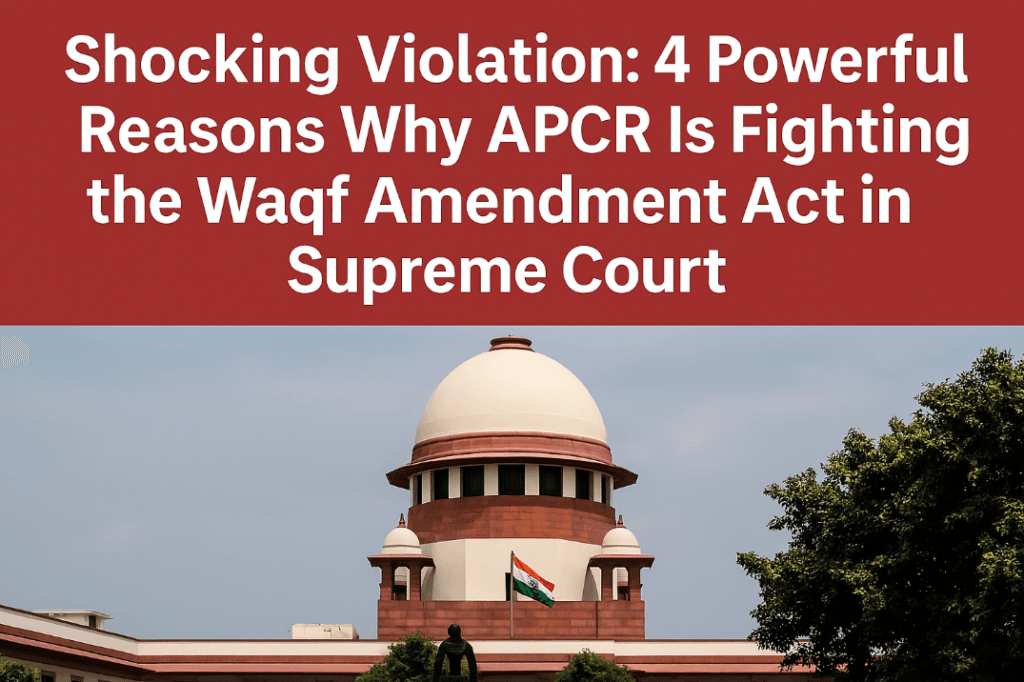Shocking Violation: 4 Powerful Reasons Why APCR Is Fighting the Waqf Amendment Act in Supreme Court
The Association for Protection of Civil Rights (APCR) has filed a petition in the Supreme Court challenging the Waqf (Amendment) Act, 2025, calling it a serious violation of constitutional rights. The NGO argues that the new law infringes on Articles 14, 25, 26, and 300A by interfering with the religious autonomy and property rights of the Muslim community. A major concern is the change in the Act’s title, which APCR says undermines the historical and religious significance of the term “waqf.”
The petition also objects to allowing non-Muslims in the administration of waqf institutions, highlighting discriminatory practices not applied to other religious groups. The removal of Section 3(r), which protected waqf by user, is seen as a deliberate move to weaken legal safeguards for religious properties. The Act’s exclusion of disputed or government-labeled properties from waqf recognition raises fears of unjust state acquisition. APCR warns this could lead to widespread litigation and further marginalize an already underrepresented community.
Overall, the petition claims the amendment erodes religious freedom and disrupts India’s secular constitutional balance.

Shocking Violation: 4 Powerful Reasons Why APCR Is Fighting the Waqf Amendment Act in Supreme Court
The Association for Protection of Civil Rights (APCR), a non-governmental organization, has approached the Supreme Court to challenge the recently enacted Waqf (Amendment) Act, 2025, alleging it violates fundamental rights and threatens the religious freedom of India’s Muslim community. Filed on April 5 by APCR’s General Secretary, Malik Mohatsim Khan, the petition argues that the law undermines constitutional safeguards, including equality (Article 14), religious rights (Articles 25–26), and property protections (Article 300A). The NGO claims the amendments interfere with Islamic practices rooted in the Quran and Hadith, risking communal harmony and secular principles.
Title Change Erases Religious Significance
The petition criticizes the law’s revised title—Unified Waqf Management, Empowerment, Efficiency, and Development—for replacing the term “waqf,” which holds deep religious and cultural meaning in Islam. Historically, “waqf” refers to properties permanently dedicated for religious or charitable purposes, recognized in Islamic and Indian law for centuries. APCR argues that the rebranding reflects a “colonial mindset,” erasing Islamic identity under the guise of modernization. While the government promotes traditional institutions in other contexts, the petition alleges hypocrisy, as the amendment weakens a centuries-old Islamic legal concept without valid justification.
Discriminatory Interference in Religious Autonomy
APCR highlights unequal treatment compared to other religions. For instance, Hindu religious boards in states like Uttar Pradesh, Kerala, and Tamil Nadu are managed exclusively by Hindus. However, the amended Waqf Act permits non-Muslims to participate in waqf administration—a requirement not imposed on other faiths. This, the NGO argues, creates a double standard, disproportionately targeting Muslim institutions. Citing the Sachar Committee Report (2006), which documented systemic marginalization of Muslims in governance, the petition warns that such interference could deepen communal divides and violate constitutional secularism.
Removal of Legal Safeguards Endangers Religious Sites
A critical concern is the deletion of Section 3(r) from the original Waqf Act, which recognized properties as waqf based on long-standing religious use, even without formal documentation (known as “waqf by user”). This provision was upheld by the Supreme Court in the 2019 Ayodhya verdict. APCR warns that its removal jeopardizes thousands of mosques, dargahs, and charitable sites—especially those lacking paperwork but used for generations. Without this protection, individuals may face costly legal battles to prove ownership, burdening communities and enabling land grabs. The petition argues that this change contradicts past judicial rulings and ignores historical realities.
Exclusion of Disputed Lands Risks State Takeovers
The amendment also bars disputed or government-classified properties from being declared waqf. APCR contends this opens doors for authorities to seize lands used by Muslims for worship or charity, even if historically recognized as waqf. For example, properties under litigation or tagged as “government-owned” in records—despite decades of religious use—could now be denied protection. This creates legal ambiguities, fuels land conflicts, and strips waqf boards of authority to manage such assets. The NGO warns that this will shrink resources available for Muslim educational, healthcare, and welfare initiatives, worsening socio-economic disparities.
Broader Threat to Secularism
The petition concludes that the amendments collectively violate India’s secular framework by singling out Muslim institutions for state control while exempting others. It argues that waqf properties, meant to serve public welfare, are now vulnerable to political interference, undermining religious autonomy. By dismantling legal safeguards, the law risks reviving tensions similar to past disputes over religious sites, destabilizing social harmony. APCR urges the Supreme Court to strike down the amendments as unconstitutional, emphasizing that protecting minority rights is integral to India’s pluralistic democracy.
The case, led by advocates including Adeel Ahmad and Atul Yadav, underscores a growing debate over religious freedom and state overreach. As the Supreme Court reviews the petition, the outcome could set a precedent for how India balances modernization with the preservation of minority rights in a diverse society.
You must be logged in to post a comment.